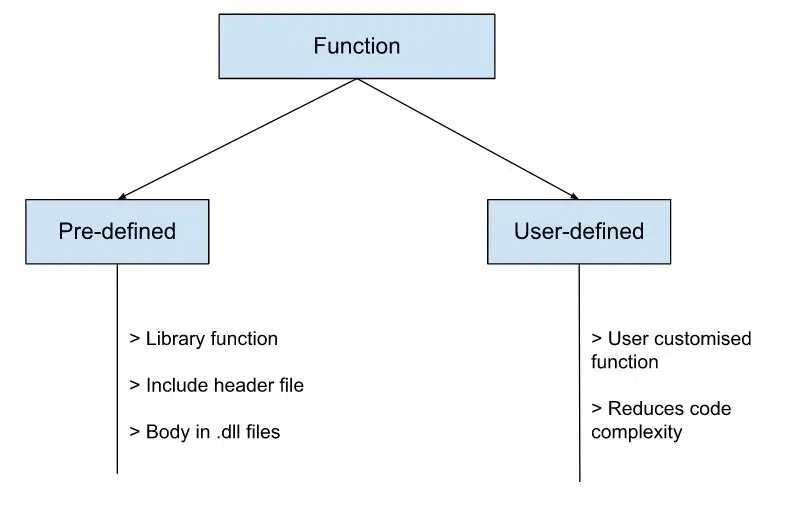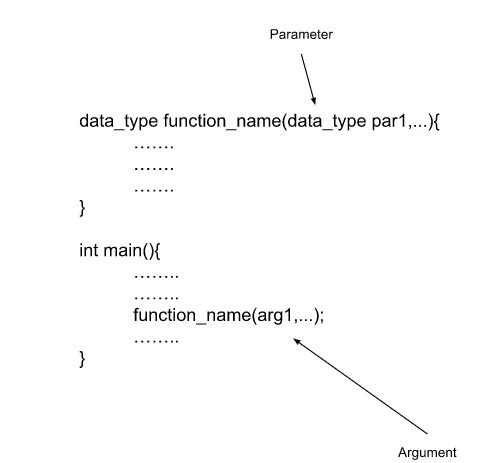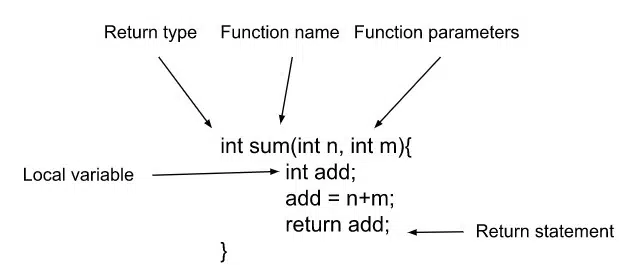Coding is the process through which people train computers to do specified tasks. What if these programs are composed primarily of instructions?
It will be challenging for programmers to manage, test, and debug such algorithms. The causes will include redundant codes, a lack of utility separation, and an unlogical flow of events.
The solution to these problems is functions.
Before, studied about Different functions in C programming language, you must know about data types, identifiers, keywords, strings and pointers in C.
Table of Contents
hat is a function in C language with an example?
Now describe a function. Each programming language allows programmers to create sequences of instructions that only execute when necessary to complete a particular job. The instruction sets refer to Functions. It breaks down a complex code into smaller, repeatable components.
Also Read: What is Recursion in C Programming with examples
It has a specific function construction mechanism called subroutines or procedures according to the programming language chosen. In C, functions are defined by providing a label alongside parentheses and enveloping the code block in curly braces. Next, give the function some input, and it will return some information.
Main() is a special built function responsible for initiating the program execution and concluding it, the most classic example of a function in C.

Important Terminology
- Argument: Variables within parentheses during a function call. Also called a formal parameter.
- Parameter: Variables defined during a function declaration within the parentheses. Also called an actual parameter.

The same number of arguments as the parameter is passed as declared in the function declaration.
Function Aspect
| Function Declaration | Function syntax | return_data_type function_name(parameter list) |
| Function Definition | Function code block | return_type function_name (parameter list) {function body;} |
| Function Call | Using function within program | function_name (argument_list) |
How to Write the Syntax of a Function in C?
In C, the syntax for a function declaration is as follows:
return_type function_name(data_type parameter…){
//code block
}

What are the Different Types of Functions in C
Based on defining, a function can be broadly classified into two types.:
➢ Pre-defined functions
➢ User-defined functions
To clarify, explanations with examples are provided below,
Pre-Defined Functions
These functions have been incorporated into the programming language system or declared inside the system library of the C compiler to deliver error-free programs; users aren’t required to develop these functions from scratch and must also be acquainted with syntax. The terminology “standard library functions” could also be used.
To access this particular type of function, a header file must be included with the following syntax, #include<required_header_file>. These are widely used to perform standard operations.
To help you comprehend, use the example of the printf(), a pre-defined function found in the stdio.h header file of C programming is frequently used to print necessary values or sentences.
Code Example
#include<stdio.h>//header file for basic i.o functions
int main(){
//main() is responsible for the execution of the codes
printf(“Hello World);//predefine in stdio.h
return 0;
}
Other examples include scanf(), strcat(), and sqrt() from the stdio, string, and math header files, respectively, and others.
User-Defined Functions
It’s characterized as a specific subclass function defined by programmers, indicating that C empowers developers to generate custom functions to execute necessary activities. The developer determines the function’s operation based on their requirements before implementing it. One alternative phrase is “tailor-made functions.”
There is no requirement to add a header file for function declaration because the function is user-defined.
To help you comprehend, consider the following example.
Code Example
#include<stdio.h>
int sum(int n, int m){
return n+m;
}
int main(){
int a = 4;
int b = 3;
int result;
result = sum(a, b);
printf(“ sum of %d and %d is %d”, a, b, result);
return 0;
}
Due to the nature of the user-defined function, there is no need to include a header file when declaring. Its declarations do not contain code blocks but instead notify the compiler about it, which will be implemented in the program later. The name, parameters, and return type are all listed in the function declaration.
i.e.
return_type function_name(data_type1 para1, data_type2 para2, … type paraN);
Ways of a Function call in C
Function calls are requests made by the programme for the execution of a defined function in a specific location in the program’s code. If there are any parameters, they are passed with the function name enclosed in parentheses. A variable of the same data type holds the value if the function returns some values. As in the example shown above, the integer result variable is used to hold the returned additional integer value from the sum function.
Code Example
#include<stdio.h>
int sum(int n, int m){
return n+m;
}
int main(){
int a = 4;
int b = 3;
int result;
result = sum(a, b);
//function call
printf(“ sum of %d and %d is %d”, a, b, result);
return 0;
}
A function can be called in two ways:
➢ Call by value
➢ Call by reference
Call By Value
A practice where value is supplied to the function as an argument when invoking.
The parameter is not updated whenever a value is changed inside the function.
It is, thus, a mechanism that protects initial data values.
Mechanism
It duplicates the real data of an argument into the function’s formal parameter and stores it at distinct memory locations.
#include<stdio.h>
int sum(int n, int m){
return n+m;
}
int main(){
int a = 4;
int b = 3;
int result;
result = sum(a, b);
//function call by value
printf(“ sum of %d and %d is %d”, a, b, result);
return 0;
}
Call By Reference
A convention in which argument reference or argument address is supplied to a function as a parameter. Alteration in the actual value in the callee is mirrored in the caller as both parameter and argument have the exact same memory location.
#include<stdio.h>
int sum(int *n, int *m){
return *n+*m;
}
int main(){
int a = 4;
int b = 3;
int result;
result = sum(&a, &b);
//function call by reference
printf(“ sum of %d and %d is %d”, a, b, result);
return 0;
}
Difference Between Call by Value and Call by Reference
Call By Value Call By Reference
| This means copies of data are sent. | This means addresses of the data are sent. |
| Formal parameters are ordinary variables. | A formal parameter is a pointer to the variable. |
| At most only one value can be sent back to the calling function. | Several results can be sent back to the calling function. direct |
| Actual parameters are affected by changes made within the function. | Direct changes are made to the actual parameters. |
This call by value and reference depends on the argument passed to the function. Functions do not necessarily demand arguments and return value. Based on this factor, user-defined functions can be categorized into the following five types.
➢ Function with no arguments and no return values
➢ Function with no arguments and one return value
➢ Function with arguments and no return values
➢ Function with arguments and one return value
➢ Function with multiple return values
To understand the above categories consider the below examples.
Function without Arguments and Return Value
Code Example,
#include<stdio.h>
void cube_of_n(){
int num, cube;
printf(“Enter a number to print its cube ”);
scanf(“%d”, &num);
cube = num*num*num;
printf(cube of %d is %d”, num, cube);
}
int main(){
printf(“Cubic value\n”);
cube_of_n();
return 0;
}
Here neither argument is given to the function cube_of_n, i.e., cube_of_n(), nor it returns any value.
Function without Arguments and with Return Value
Code Example
#include<stdio.h>
void cube_of_n(){
int num, cube;
printf(“Enter a number to print its cube ”);
scanf(“%d”, &num);
cube = num*num*num;
return cube;
}
int main(){
int value;
printf(“Cubic value\n”);
value = cube_of_n();
printf(cube is %d”, value);
return 0;
}
Here no argument is given to the function cube_of_n, i.e., cube_of_n(), but it does return a value, i.e., return cube;.
Function with Arguments and without Return Value
Code Example
#include<stdio.h>
void cube_of_n(int num){
int cube;
cube = num*num*num;
printf(cube of %d is %d”, num, cube);
}
int main(){
int num;
printf(“Enter a number to print its cube ”);
scanf(“%d”, &num);
cube_of_n(num);
return 0;
}
Here an argument is given to the function cube_of_n, i.e., cube_of_n(num), but it does not return a value.
Multiple Arguments
Code Example
#include<stdio.h>
int sum(int n, int m, int s){
int result;
Result = n+m+s;
printf(“sum of %d, %d and %d is %d”, n, m, s, result);
}
int main(){
int a = 4;
int b = 3;
int c = 8;
int result;
result = sum(a, b, c);
return 0;
}
Function with Arguments and with Return Value
Code Example
#include<stdio.h>
void cube_of_n(int num){
int cube;
cube = num*num*num;
return cube;
}
int main(){
int num, value;
printf(“Enter a number to print its cube ”);
scanf(“%d”, &num);
value = cube_of_n(num);
printf(cube is %d”, value);
return 0;
}
Here an argument is given to the function cube_of_n, i.e., cube_of_n(num), and returns a value, i.e., return cube;.
Advantages of Functions in C
★ Reduces the program length.
★ Easy to locate, maintain and test
★ Reusable, programmers do not have to start from scratch.
★ Top-down modular programming
★ Provide neat and clean code, i.e., reduces debugging time.
Disadvantages of Functions in C
★ Demands that the programmer be an expert in C. The hassles that C frequently induces, particularly for the novice, greatly exceed any run-time benefits.
★ There might not be any benefit in speed.
★ It’s less portable.
Conclusion
Functions are covered in detail in this article. A function is a group of instructions that, when necessary, are employed to carry out a particular task. Its main advantage is that it shortens programs and is reusable. Also included here are Different Types of Functions in C, function calling, and demonstrations.
Read other topics as well.
Frequently Asked Questions (FAQs)
Q1. What is a calling function in C?
Ans. Functions calling means a function is called inside the program whenever needed. function_name(argument list) represents it.
Q2. Why do we use functions in the C programming language?
Ans. Function is an important part of C programming for debugging, maintaining, and testing. That’s why functions are preferred.
Q3. Why do we need functions in C programming?
Ans. Function is used because of its reusability, reducing program length and providing clean code features.
Q4. What is their purpose?
Ans. Function enables programmers to decompose complex programs into smaller parts that are easy to understand and reduces debugging time.
